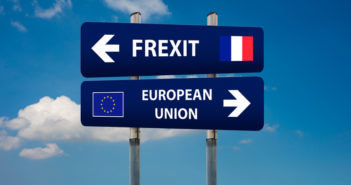In an interview with FXStreet, we discussed everything related to the French presidential elections. The top political market mover of the year is watched with great tension by EUR/USD traders and could have a long-lasting impact on the common currency and the European Union.
You can read the interview at its original publication here or below:
How low can the EUR/USD go if Marine Le Pen wins the French election?
A victory for Marine Le Pen has very small chances but could have grave consequences for the euro. The mere idea of France leaving the single currency could set the snowball rolling and turn into an avalanche. Even if French voters reject a proposition to leave the euro and even if Le Pen backs down from her desire to put the question on the ballot, her victory could easily send EUR/USD below parity and all the way to 0.90. There is no euro without France, the core of the core.
And how high can it rise if Le Pen is not the next French president?
EUR/USD has room to the upside in case Le Pen is defeated by either Macron or Fillon. The baseline scenario is for her to be kept out of the Elysee Palace, but it is not fully priced in. A rise to 1.10 or even 1.12 could be seen. The reactions to the first and second round will probably differ according to who makes it to the second round. As Macron has better chances to beat Le Pen than Fillon, we could see a big chunk of the upside move happening already after the first round on April 23rd, in case Macron indeed makes it to the second round. Another sigh of relief that translates into another rise for the euro could come on May 7th, albeit at a much smaller scale. If Fillon makes it to the second round, we could see the euro drop after the first round and make a big leap on Fillon’s victory in the second round.
How big of a risk will the French election be for the markets?
The French elections are a “low probability, high risk” event. The chances for a Le Pen victory are much lower than Brexit and Trump. Last year’s big political upsets were preceded by very close opinion polls and the results were within the margin of error. This time polls clearly show Le Pen losing to just about anyone. However, France is not Greece and not the Netherlands. Its importance is huge. It seems that the euro is held back by the upcoming elections. Markets are “bitten once, twice shy” as the expression goes, with a somewhat exaggerated fear about the outcome following last year. A victory for Macron or Fillon could unleash the common currency. Stronger economic growth and higher inflation justify a stronger euro.
Which is the best tool to track French-election market risk? French bonds? Polls? EUR futures?
So far, French bonds reflected some of the mood swings ahead of the French elections, as the euro was also influenced by many other factors. As we get closer to election day, the euro is likely to swing a lot more on any opinion poll or election-related event such debates, investigations, etc. High-frequency daily polls could determine bigger moves. The OpinionWay poll published every weekday at 10:00 GMT, in the middle of the European session, could have the strongest influence, apart from unexpected events.
Could the French election have a GBP-Brexit-type effect on the EUR?
Yes. In case Le Pen wins, the euro is likely to crash at the same magnitude as the pound collapse on June 24th. In addition, the common currency could continue dropping afterward. It would take an 180 degrees shift from Le Pen on her stance towards the euro to sooth the pain, and it may be too late. Regarding bonds, the reaction could be different: an exodus from French bonds and a rush to buy German ones. A redenomination of French treasuries in francs means a big haircut for bondholders.
Should traders prepare for important gaps in the Euro on the post-French-election Monday opening?
Yes, Sunday gaps have been seen as a reaction to other significant elections that were held on Sundays. Exit polls are due well before markets open, and even if they show a close race, we can embrace ourselves for such gaps. On April 24th, we can expect an upside gap if Macron makes it to the second round and a downside gap if Fillon sneaks in. On May 8th, a Le Pen victory could result in a big hole in the chart to the downside, while the magnitude of the upside gap in case she loses depends on her opponent. A Fillon victory could result in a wider gap than the gap in case we see Macron winning the presidency.
Is the European Union “two-speeds” idea good for the EUR in the long-term?
A “two-speed” or “variable geometry” Europe could be a good solution for the European Union and the euro if done wisely. A core of euro-zone countries could be surrounded by a ring of countries with looser ties. This is already the situation today with non-euro-zone countries. Also, a third ring of European countries which are currently non-members but that could have lesser access, would be a good addition. A key to the success of such a design would be flexibility: the option to upgrade or downgrade the status of a country relatively easily. At the moment, leaving the euro-zone poses a danger and leaving the EU (as Britain is doing) is also a danger to the whole structure. A new EU model would take time to design and implement. And if we learn from the past, it could turn into a “euro-fudge” – a poorly designed system that would struggle with the first crisis.
